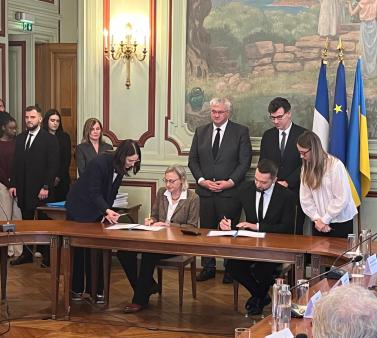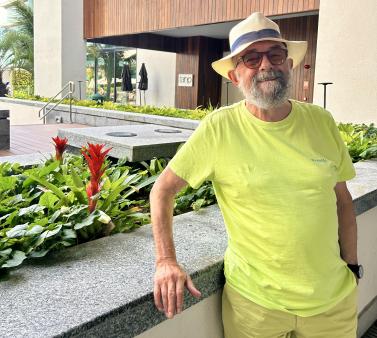* The online survey questions and replies were originally written in French. The charts which appear in this article have been taken directly from the survey and not translated.
Global overview of results
The student survey was organized with 2 objectives in mind: to ascertain the living conditions of our students during this confinement period and to identify the difficulties they are encountering (financial, academic, practical, psychological...).
A majority of respondents said that they were not completely isolated and that they felt quite comfortable, but a substantial proportion also said that they were experiencing difficulties. A significant proportion of students find themselves in problematic or even worrying situations (between 10 and 20% of respondents, depending on the indicators used).
Highly varying living conditions under confinement
Housing, distance and estrangement

Just over 10% of students reported being alone during this period. Two-thirds are with their family and just under ⅕ are in confinement with other persons. While a slight majority are in Rennes or Saint-Brieuc, or less than an hour from their associated campus, 45% are further away, (i.e. further than 1 hour away, in the French overseas departments and territories or in other countries).
Computer equipment and Internet connection: ¼ in difficulty
Among the students who were able to take part in this survey, and therefore have some access to the Internet, 80% of the students have a computer for personal use, 7% are sharing equipment, and 1.4% do not have a computer at all. Internet access is a problem for 15% of students, who report limited access, often included in phone packages.
A majority report no personal difficulties but there are vulnerabilities

More than half of the students (58%) report feeling well or quite well after 10 days of confinement. But 25% admit to being hesitant, saying they don't really know whether they feel good or not, and more than 10% say they feel bad or rather bad.

More than half reported difficulties, not always due to the confinement but aggravated by it.
More than ⅓ report difficulty following their courses

Respondents most frequently listed academic difficulties, linked to educational continuity, as being most problematic, concerning more than ⅓ of the students. This was followed by psychological (more than ¼), financial and practical difficulties (⅙ in both cases). But these difficulties are cumulative... and about 10% of students report 3 or more types of difficulty.
Warning signs: educational continuity, finances, stress, etc.
The academic, practical and financial difficulties being reported are probably related to the significant proportion of students (more than ¼) reporting psychological difficulties. In concrete terms, the responses are indicative of high levels of stress, possibly even burnout (especially for working students and students with children). Beyond the anxiety related to the epidemic (fear for oneself and for loved ones), their daily lives have been upset and some students say they are feeling overwhelmed, lost and worried. The lack of visibility on exam conditions is amplifying these feelings.
Satisfactory educational continuity for ⅔ of respondents, but adjustments need to be made.
Two-thirds of the students said they consider the solutions proposed by our educational teams as (rather) appropriate in these exceptional circumstances. Nevertheless, many students reported difficulties related to distance learning: increased workload, organizational difficulties, difficulties in interacting with other students, etc...

Unequal studying and working conditions
For some, the practical difficulties related to distance learning are important: access to digital tools (absence or necessity of sharing), access to the Internet, the presence of children or siblings to take care of, difficulty in balancing the constraints of a job or requisitions (hospitals, food shops).
Financial difficulties
Respondents who reported financial problems noted the loss of employment (paid internships, temporary and part-time work, etc.). There may be a cumulative effect for partners of a couple who are each experiencing the same problems. Worries related to the paying of rent and bills are frequent.
With regard to the difficulties related to educational continuity, our teachers have been briefed on the situation. The new schedule and modalities of Rennes 2 final exams can be found here.
To respond as soon as possible to these psychological, financial and health difficulties, the university's teams are working to strengthen, diversify and coordinate the various types of assistance that can be made available. Emergency assistance and support plans are being set up with the Student Health Service (SSE) and the CROUS. Finally, higher education institutions are continuing to mobilise funds in order to strengthen and diversify exceptional aid as quickly as possible.
Details of the respondents
Who participated in this survey?
The analysis involves replies from 3,468 students who participated between March 26 and 27, 2020.


The above charts show the student respondents by year of study and by geographic location. The survey return rate in relation to the total number of students enrolled at Rennes 2 is approximately 16%, respecting the distribution of students on the different campuses.
Returns according to the year of study are fairly in line with the observed structure for the total student population at Rennes 2, even if there is a slight over-representation of 2nd and 3rd year students among the respondents.
Rennes 2 University survey referents:
Céline Piquée, Vice-President in charge of Student and Campus Life
Patricia Legris, Vice-President for Health, Solidarity and Social Support for Students
Fabien Caillé and Clément Gautier, Student Vice-Presidents




